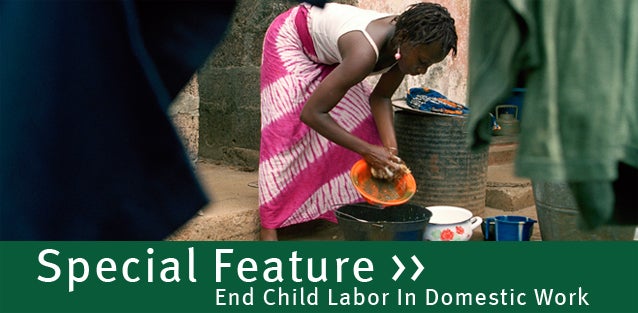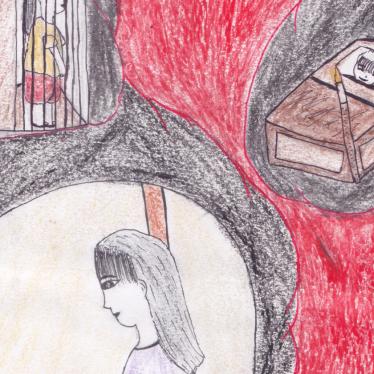(New York) – Governments should mark June 12, 2013, the World Day against Child Labor, by strengthening legal protections for the 15.5 million child domestic workers worldwide, Human Rights Watch said today. Governments should ratify the International Labour Organization (ILO) Domestic Workers Convention, which has specific provisions for children, including on education and protection from violence.
This year’s theme for the World Day against Child Labor is “no child labor in domestic work.” The ILO estimates that children make up nearly 30 percent of domestic workers worldwide and that 73 percent of them are girls.
“To eliminate child labor, governments cannot ignore the children working in private homes,” said Jo Becker, children’s rights advocacy director at Human Rights Watch. “Many of these children are paid a pittance, if at all, and often suffer abuse and overwork. Governments can help these children by ratifying the Domestic Workers Convention.”

Photo: Girl domestic worker in Conakry. © 2007 Susan Meiselas/Magnum Photos
By ratifying the treaty, governments can help end child domestic labor, Human Rights Watch said. They can also ensure that those who are old enough to work enjoy the same rights as other workers, such as a day off and a minimum wage.
Since the adoption of the Domestic Workers Convention in June 2011, seven countries – Uruguay, the Philippines, Mauritius, Nicaragua, Italy, Bolivia, and Paraguay – have ratified it. Others are working to bring their national laws into compliance with the convention’s standards. For example, in March, Argentina adopted a new law establishing 16 as the minimum age for domestic work and setting strict limits to the number of working hours for children between 16 and 18.
Human Rights Watch investigations have found that many child domestic workers work 12 or more hours a day, seven days a week, for very low wages. Many are never paid at all. Typical duties include cooking, cleaning, washing dishes, doing laundry, ironing clothes, shopping, and caring for children and elderly members of their employer’s household.
According to a new report by the ILO, nearly half of all child domestic workers are under 14, with 3.5 million between 5 and 11. Some employers deliberately seek children for domestic work, believing that they are easier to control and can be paid less. National laws setting a minimum age for employment are often not enforced for domestic work, allowing employers to exploit children with no consequences.
Families from poor, rural areas may believe that domestic work in a larger city offers a child better living conditions and opportunities for education, future employment, or marriage. However, child domestic workers are frequently denied education. A Human Rights Watch investigation in Indonesia, for example, found that only one of the 45 child domestic workers interviewed for the study was attending school.
Child domestic workers often have little contact with the outside world and are at heightened risk of physical, sexual, and psychological abuse. Studies have found that 68 percent of child domestic workers surveyed in India and 56 percent surveyed in Togo reported physical punishment by their employers. Verbal abuse – including shouting, insults, and threats – is even more common.
“Girls and boys in domestic work are extremely vulnerable to many forms of harassment and abuse, including involuntary servitude and trafficking,” Becker said. “It’s long overdue for governments to stop neglecting the rights of these marginalized children and protect them.”
The Domestic Workers Convention (International Labour Organization Convention Concerning Decent Work for Domestic Workers, No. 189) obliges governments to take steps to eliminate child labor in domestic work and to set a minimum age for domestic work in accordance with international standards. Under the treaty, child domestic workers above the minimum age of employment are entitled to the same labor rights as workers in other occupations, including daily rest and weekly days off, limits to hours of work, and minimum wage coverage.
The convention also requires governments to ensure that domestic work by children above the minimum age of employment does not deprive them of compulsory education or interfere with opportunities to participate in further education or vocational training.
Events are planned this year in at least 60 countries for the World Day against Child Labor.
“The Domestic Workers Convention protects adults and children alike,” Becker said. “Governments that ratify the convention will be introducing essential safeguards that can improve the lives of millions of child domestic workers.”








